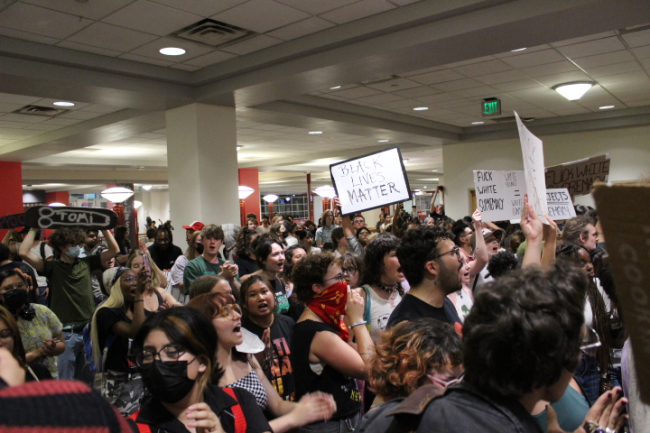You have /5 articles left.
Sign up for a free account or log in.

Student protesters inside UNM’s Student Union building, where conservative pundit Tomi Lahren was speaking Thursday.
Mackenzie Schwartz/The Daily Lobo
The University of New Mexico became the latest stage for a now-familiar campus drama on Thursday, when student protesters disrupted a controversial speaker’s event and reignited discussion on the state of free speech on American college campuses.
Over 100 students gathered on Thursday outside the Albuquerque university’s Student Union Building to protest conservative commentator Tomi Lahren, who the UNM chapter of right-wing campus group Turning Point USA invited to speak at a ticketed event. The protesters chanted, “We don’t want you here!” and “Shut it down!” A few student organizers gave speeches, and then the protesters entered the building and approached the ballroom where Lahren was speaking.
Though the protests outside had been relatively calm, tensions rose once demonstrators entered the building. Students banged on the walls, putting a hole through one of them; during the confusion, somebody pulled a fire alarm.
TPUSA booked Lahren from 7:00 to 9:00 p.m., and she was reportedly able to finish her speech. But during the question-and-answer session, around 8:00 p.m., law enforcement escorted her out of the back of the Student Union. Most of the event’s attendees were led out soon after, according to on-the-ground reports.
In the hours following the canceled event, Lahren called protesters “campus terrorists” and “rabid banshee animals,” claiming that UNM “did not care” about the disruption or her safety. A statement from TPUSA also said that Lahren and her father were “barricaded in a safe room for 45 minutes.”
But Maddie Pukite, a junior at UNM and the managing editor of the student newspaper The Daily Lobo, was at the UNM protests from start to finish and said they were much more peaceful than many media reports have alleged.
“Emotions were high, and that came from students’ anger, but there was absolutely no violence,” Pukite said. “That narrative is completely false.”
UNM issued a statement Friday promising to investigate any instances of vandalism and other violations of university policy.
“We are deeply disappointed in the actions of those individuals who intentionally chose to disrupt a scheduled speaker and infringed upon the rights of the speaker and those who attended the event to listen and engage,” the statement said.
The protesters weren’t the only ones accused of hampering free expression at the event. Students reported that despite having tickets, they were denied entry by Turning Point USA staff; many of those turned away were students of color.
Tyler Jacobs, a freshman who is African American and Filipino, told Inside Higher Ed that though he disagreed with Lahren on most issues and felt disappointed that the event was being held, he got a ticket in order to “to compare perspectives in a productive manner.” But when he got to the door, he said he was turned away by a TPUSA student organizer. Minutes later, he said, they let in two white students and remarked that they “look normal.”
“I find it incredibly ironic that Fox News is saying they should have just gone in there and talked to Tomi, when that’s exactly what my intentions were,” Jacobs said. “They shut down my free speech by not allowing me to go into the event and have a conversation. Everything that happened, they did to themselves.”
UNM president Garnett Stokes, addressing the incident in her weekly Monday letter to the UNM community, said that the university would investigate both the conduct of student protesters and the event organizers’ alleged denial of entry to students “based on their appearance.”
“The safety of our campus community and visitors is always our first priority, and these types of behaviors create a potentially unsafe environment,” Stokes wrote. “UNM is investigating each of these incidents and will hold those who have violated the law or University policies accountable.”
‘A Slap in the Face’ for Minority Students
Lahren, a right-wing internet personality and Fox Nation host, has a history of making controversial, often offensive remarks, particularly about racial justice activists and undocumented immigrants. She has compared the Black Lives Matter movement to the Ku Klux Klan and said that undocumented immigrants are part of a great replacement–style conspiracy led by Democratic lawmakers.
UNM is technically a minority-serving institution, given that more than 50 percent of the student body are ethnic minorities. With over 28 percent of its students identifying as Hispanic, it is also a Hispanic-serving institution.
Pukite said the protesters were largely students of color, particularly Latinx students, many of whom told Pukite that having Lahren on campus felt like “a slap in the face” – especially coming on the first day of Hispanic Heritage Month.
Preparing for the Predictable
The incident at UNM is, at this point, a version of a recurrent campus story: a conservative student group invites a controversial speaker, the speaker provokes backlash and protests, and universities are left to watch the fireworks – and sometimes, to foot the bill for any damage.
Thursday’s protests were not the first time UNM has gotten caught in this cycle. In 2017, UNM’s college Republicans invited Milo Yiannopolous, the disgraced former Breitbart editor, to speak. His appearance prompted a large police presence and brought hundreds of protesters to campus, where tensions boiled over into clashes and arrests.
It’s also not the first time Lahren has drawn protests on a campus; her 2019 college speaking tour was titled Stay Triggered, suggesting that provoking reactions from students is part of her goal. Her description of the UNM student protesters in subsequent interviews evoked images of controversial writer Charles Murray’s 2017 appearance at Middlebury College, during which students shut down his speech and attacked a car escorting him off campus.
Deutchman said that while it’s hard for institutions to anticipate the scale and force of student protests at campus events, colleges and universities should do more to be proactive in preventing these kinds of incidents.
“I would say to any campus, ‘Don’t wait until this comes to you. Be ready,’” she said. “The school right now is dealing with the aftermath, but I think schools need to be doing more midterm and long-range planning.”
She recommended education programs for students on the difference between protected speech and disruption, as well as partnerships across university departments to put a robust response plan in place.
“I think universities need to have a team of folks from across different parts of campus—public safety, speech folks, Student Affairs folks, conduct folks, policy folks—coming together to really think through these questions,” Deutchman said. “It’s also about educating students to understand the difference between protected protests and unprotected disruption, and the consequences for the latter.”
Deutchman also said that institutions may be out of practice after two years of relatively quiet campuses and far fewer in-person events to draw this kind of controversy.
“We’re coming out of a very unusual time in higher education, where we have not really had an academic school year where everybody is back on campus, where we’re having speakers and events,” Deutchman said. “I think there’s a little bit of flexing those stiff muscles and dusting off the toolbox going on.”





